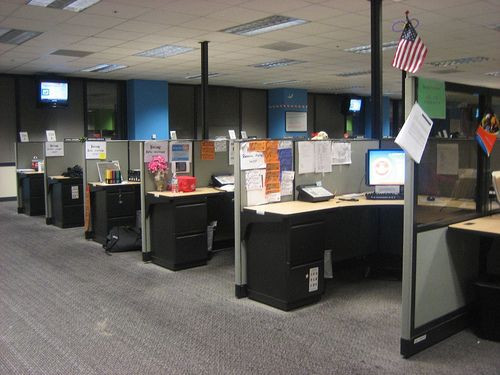Eat At Your Desk If You Want To Be More Productive At Work: How Going Out To Lunch Reduces Cognitive Ability

While the prospect of ditching work to grab lunch out in the real world may seem like welcome respite from the confines of your cubicle, new research suggests eating at your desk helps maintain alertness and cognitive abilities over the course of the day.
The Test
Researchers from the Humboldt University at Berlin tested 32 women on their cognitive, emotional, and semantic memory abilities pre- and post-meal sessions. They were looking for any fluctuations in performance depending on the context in which the meal was consumed — either alone at their desk, or at a restaurant in the company of others.
The performance measures included tests of cognitive control, error processing, semantic memory, and emotion processing.
The researchers couched their study in the assumption that meals often serve dual purposes. Not only do they offer nutritional value in the food people consume, but they also facilitate socialization among those involved.
"Since meals can have effects on mood, emotion research may be a good starting point if one looks for possible distal, non-nutritional effects of meal contexts," the team wrote in its report, which was published in the journal PLoS One.
To test this claim, the researchers let one group of women go out to eat with a friend, eat whatever they wanted, and casually conclude the meal when it reached a natural end. The control group, however, ate a prescribed lunch at a plain white desk under a minimal amount of time.
"The manipulation of meal selection, a restaurant setting and company allowed for several contextual factors that may potentially contribute to a pleasant meal context for the experimental group," the report states. "In the control group, we attempted to reduce the meal and its context as much as possible to the intake of calories and nutrients but without inducing adverse emotional states."
In conducting this experiment, the team presented two models for how positive mood could affect performance, specifically in regards to the experimental group.
"Those in a good mood will excel when the task is complex and past learning can be used in a heuristic way to more efficiently solve the task or when creativity and flexibility are required," the researchers noted. "On the other hand, positive mood has been found to impair mechanisms of adaptive cognitive control like updating, planning, and switching in a number of other studies."
The Results
Both groups showed markedly better abilities in either cognitive control or emotion processing, depending on the context in which the meal was consumed. Tests of semantic memory showed no results.
The researchers compared the response to emotional stimuli as congruous with the Simon test they performed for cognitive control. The Simon test refers to reaction times to stimuli being much faster when the response is made in the same location as the stimulus, regardless of the stimulus' relevance to the task.
Subjects in the experimental group demonstrated faster emotional responses to threatening stimuli than those in the control group.
"This may seem surprising if one assumes that good mood after a nice meal might inoculate against aversive stimuli," the team stated. "However, if we consider the findings of diminished cognitive control from the Simon task, it may appear conceivable that the meal situation may lower one's guards against negative stimuli."
Meanwhile, the experimental group's performance diminished in perhaps the more relevant area, that being cognitive control. Women who stayed at the desk to eat lunch performed just as well on the Simon tests pre-meal as they post-meal. The women who ate out showed marked declines in performance, owing to the fact that eating out counteracts the benefit of practice in tests of cognitive ability.
"This was observed both on a conscious level, as indicated by the error-related positivity, and on a preconscious level as indicated by the error-related negativity," the team noted. "These findings are in line with our assumption that positive mood as induced by the restaurant meal reduces cognitive control."
The Upshot
This is not to say that your cubicle blues make you more productive, but rather, greater socialization outside the workplace inhibits your ability to concentrate and direct attention at concrete tasks.
The researchers acknowledge that not all professions demand the same level of cognitive control. Attenuation of such performance may, for instance, be more desirable in situations where socialization takes place more frequently. In more rigorous contexts, however, maintaining cognitive control often proves advantageous.
"Hence, quite different meal situations may be optimal," the team concluded, "if the aim is cognitive control and exactness or if wellbeing and recreation is desired."
Published by Medicaldaily.com



























